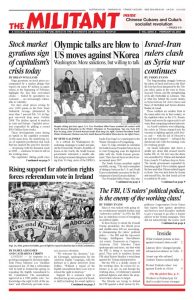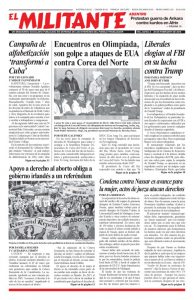NEW YORK — When U.S.-backed mercenaries invaded Cuba at the Bay of Pigs in April 1961, “literacy volunteers didn’t stop doing what we were organized to do — wipe out illiteracy across the country — we kept on going,” Griselda Aguilera told some 30 people attending a Feb. 9 meeting here in Brooklyn. Fidel Castro organized Cuba’s workers, peasants and militia to defend their socialist revolution, crushing the invasion in 72 hours.
The meeting was organized by Haiti Liberté, a newspaper distributed throughout North America. It was one of a dozen events in New York and northern New Jersey, part of an East Coast tour sponsored by a coalition of Cuba solidarity groups.
At the age of seven, Aguilera was the youngest of the tens of thousands who responded with zeal and determination to Castro’s call to join a campaign to teach Cuban workers and farmers to read and write. This was part of the revolution’s broader program to expand education and culture for working people and deepen their ability to participate and lead in social and political life.
“With ignorance,” Aguilera explained, “people lose their dignity.”
The mass mobilization to eradicate the scourge of illiteracy was carried through just two years after Cuban workers and farmers toppled the U.S.-backed Fulgencio Batista dictatorship and took power into their own hands.
The meeting began with a screening of Catherine Murphy’s movie “Maestra” (Teacher), which features interviews with volunteers.
“As I taught, so I learned,” Aguilera said, describing the experience she and other young volunteers went through in the yearlong campaign. Many lived away from home for the first time, often in remote rural areas. They joined peasants working the land during the day, discussed the unfolding revolution and its effects in the area, and taught them to read and write at night.
She explained the rising self-confidence of the volunteers and their resolve to shoulder more responsibilities to advance the revolution. This was demonstrated at the mass rally in Havana Dec. 22, 1961, that celebrated the successful completion of the campaign. “Thousands of volunteers returned from across the country,” she said, “and chanted the question to Cuban President Fidel Castro: ‘Tell us — what do we do next?’”
A couple of meeting participants snapped up Women in Cuba: The Making of a Revolution Within the Revolution by Vilma Espín, Asela de los Santos and Yolanda Ferrer, one of the books at the Socialist Workers Party literature table. It includes Castro’s talk at the rally.
The literacy campaign “would have been an impossible task for a people who live under oppression,” Castro said. “Only a revolutionary people could marshal the effort and energy necessary to carry out such a huge campaign.”
In response to a question about the drive’s political impact on those who learned to read and write, Aguilera said it made it more possible for them “to take over and run the factories abandoned by the bosses. Today Cubans are a more cultured, more political people.”
Because of her age she was assigned to teach workers in Havana. In the cities, “workers who were illiterate would give up an hour a day after work and stay in the workplace to study with the volunteers,” she said.
Following a lively discussion, four meeting participants signed up for more information about the April 22-May 6 May Day Brigade to Cuba. Brigade members will spend two weeks working alongside farmers in the fields; meet with leaders of mass organizations, participants in the revolutionary struggle and volunteers in internationalist missions; and join hundreds of thousands at the annual May Day rally in Havana.
The brigade is an opportunity to learn how workers and farmers were able to overturn capitalist rule, establish their own government and set a living example for workers and farmers to emulate worldwide.
Nancy Boyasko contributed to this article.

